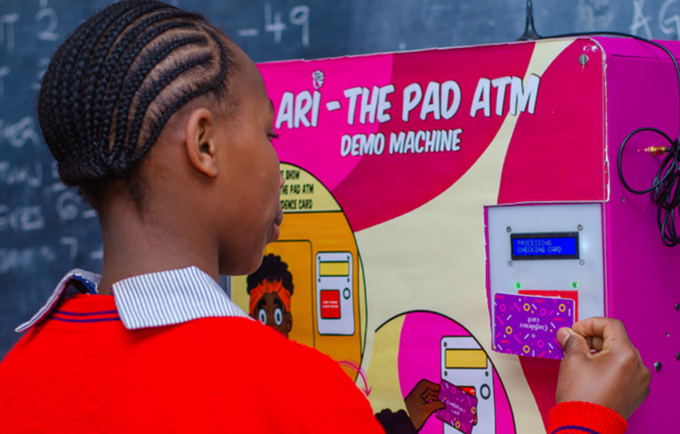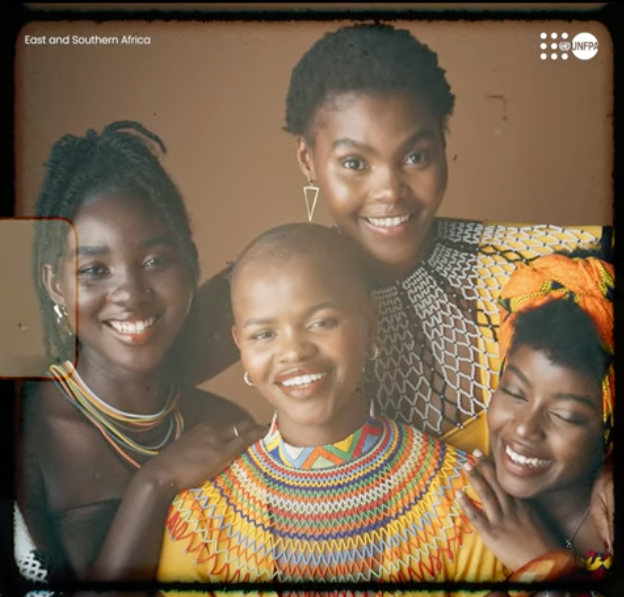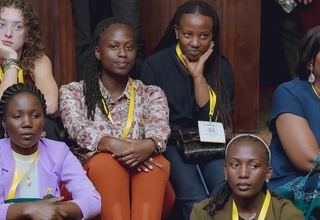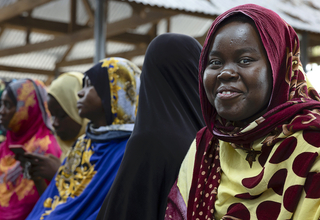UNITED NATIONS, New York – “I lead a team of six amazing women, with specialties from pharmaceutical supply chains to software engineering and digital marketing – our journey so far in empowering young women to take charge of their health has been nothing short of amazing,” said 26-year-old Chioma Uzoma from Nigeria.
Ms. Uzoma is among 14 winners of the female-led 4HerPower Challenge, an initiative between UNFPA – the United Nations sexual and reproductive health agency – MIT Solve and Organon, to support innovations in sexual and reproductive health and rights access for young people across the world.
Globally, women spend 25 per cent more of their lives in debilitating health than men do, a result of gender inequality in health research, data collection, health-care delivery and investment. It is a “women’s health gap” that costs the global economy an estimated $1 trillion.
But women innovators are stepping up to bridge the gap and save lives.
A drive to reach those left behind
In Nigeria, COVID-19 lockdowns brought a harsh realization for Ms. Uzoma. “During the pandemic, I saw how difficult it was for women and girls in my community to access quality health care and an uninterrupted supply of sexual and reproductive health products and services.”
In response, she founded the nonprofit Medvax Health – Nigeria’s first women-centric e-pharmacy. Ms. Uzoma explained that their AI-powered mobile app, Medtracka, “helps to close the equity gap in accessing adequate health care and is tailored for women and girls in low- and middle-income communities. We connect women to online gynaecologists, mental health therapists and counsellors, and the app allows easier access to diagnostics kits, medicine and personal care items, even ensuring discreet home delivery when needed.”
It has so far reached over 8,000 young people and distributed more than 4,000 sexual health products for free. Isioma* who uses the app said, “It’s not just another digital product – it has become my community, where I know that I am not alone as I navigate the unique health struggles that come with being a woman in today’s world.”
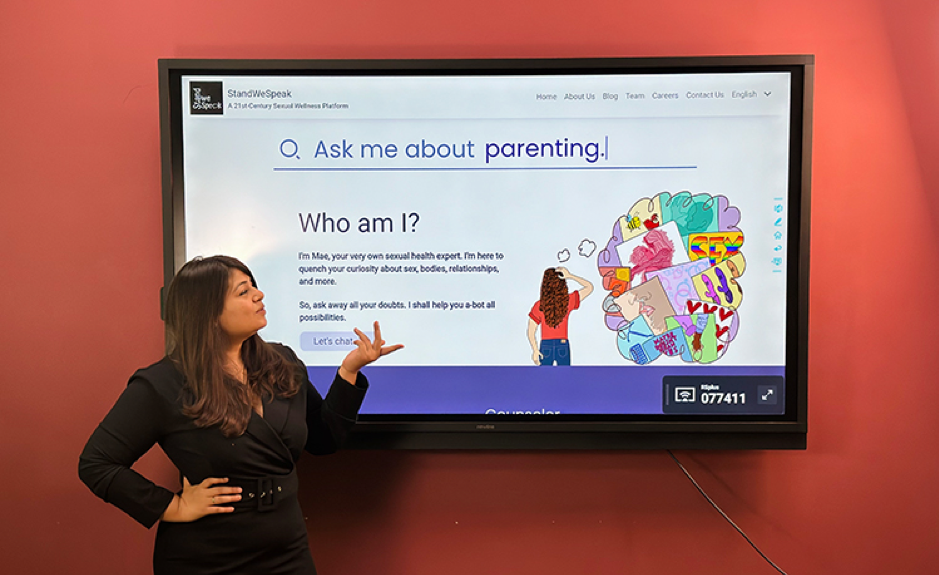
Tailored services for women, by women
Equity was a key aspect of Samiha Yunis’ Kayayei Initiative, too. Ghana's Kayayei are female porters, who carry heavy loads at market places. Typically young migrants from rural areas of the country, Kakayei have limited access to sexual and reproductive health information and services, putting them at risk of STIs and unplanned pregnancy, while their strenuous work poses maternal health risks.
“We engage them directly in our processes, ensuring our solutions are not only informed by real needs but also culturally sensitive and embraced by those we serve,” Ms. Yunis said. Her initiative has reached over 200 women and reported a 40 per cent increase in contraceptive use. “We plan to scale our data-driven interventions across Ghana and replicate our model in other low- and middle-income countries facing similar challenges,” she said.
And in Türkiye, the HERA app provides health-care guidance for vulnerable populations during emergencies. It started as a project to help refugee women and children, connecting users to reproductive, neonatal, and vaccination health-care services. HERA is the culmination of the team’s experience of constantly communicating with refugee women to understand their needs and ask about their preferred solutions.
Innovation for education
In Bolivia, SELF-DISCOVERED aims to raise awareness among indigenous and first-generation students about their rights, in particular to combat teen pregnancy rates and sexual abuse. Magali Lucana Mamani described how her project emphasizes support from within: “I witnessed the struggles of the women in my family who didn’t have the opportunity to study, much less learn about their sexual and reproductive health and rights.” Having watched her grandmother overcome adversity and discrimination to become a midwife, Ms. Mamani is following those footsteps. “My team and I are ensuring that future generations have the tools and opportunities to make informed decisions.”
For Linh Hoang, founder and CEO of the online We Grow comprehensive sexuality education platform in Viet Nam, misconceptions are still a major obstacle. “Some parents have concerns that it’s too early to teach their kids.” But thanks to partnerships with local schools and trained educators, her project is able to deliver age- and culturally appropriate lessons through an app, covering topics such as contraception options and personal hygiene. “We have reached over 50,000 children and parents, changing perceptions and fostering healthy discussions.”
And in Southeast Asia, StandWeSpeak provides sexual and reproductive health information and services directly to young people. Users can anonymously interact with Mae, a chatbot that connects them to health experts and facilitates access to menstrual hygiene and contraceptive products. Having answered 40,000 questions per month from 15,000 users across six countries, Mae has become a trusted resource.
“Our commitment to anonymity ensures that marginalized communities, often hesitant to seek guidance on these topics, can access vital information discreetly,” said team lead Priyal Agrawal.
One young user, Diya*, agreed. “No awkward talks, no judgement – just real, friendly advice whenever I need it.”
New generations, new tech
To this day, investments in women’s and girls’ needs remain woefully inadequate: In 2022, less than 1 per cent of global overseas aid went towards stopping gender-based violence, a scourge with generations-long consequences for health and rights. The YouthCare Initiative by Mayca Balaguer in Argentina is addressing this oversight by boosting the ability of sexual and reproductive health providers to identify and respond to gender-based violence. It brings expertise from health and legal organizations to providers who may otherwise struggle with cases of pregnancies resulting from sexual violence, for instance.
Munira Twahir is also addressing an overlooked need of women and girls: Menstrual products. She created Ari The Pad ATM in Kenya, installing more than 20 dispensers in schools across Nairobi and Kiambu counties, which have provided 10,000 sanitary pads to some 700 students. Fifteen-year-old Angela* said the discreet dispensers are a relief. “I like using the Pad ATM because I don’t have to ask my teachers when I need a pad – I can go to the machine and get one whenever I want.”
Ms. Twahir’s advice to other innovators? “Collaborate with the people who you are building the solution for.”
Community for mothers
Maternal health interventions and investments are not reaching those most in need. While postpartum haemorrhage is the leading cause of maternal mortality in low-income countries, only two new medicines to address it have been developed over the past 30 years, for example.
Similarly, in conflict settings, “among the most vulnerable groups are young women and mothers,” said Viktoriia Prushkivska, in Ukraine, where navigating postpartum and infant care amid raging violence has left women in a bind. In response, her team created Mom's Monday, free recovery and educational sessions where new mothers can receive support for their mental, physical, and sexual and reproductive health, with childcare provided.
More than 1,100 mothers were reached in 2023, including Ene,* who said, “Here we can get invaluable information that we would otherwise need to look for somewhere else.”
And in the United Republic of Tanzania, where more than one quarter of girls become mothers while adolescents, “many face discrimination and exclusion, making it difficult for them to access necessary support and services,” Juliana Magesa, herself a young mother, told UNFPA. She founded Young Mums Unite, a support group where mothers aged 15 to 24 can access information and essential services, including family planning, maternal health care and counselling. Young mum Annie* said, “They gave me a community of support and knowledge about my health and rights. I feel more confident and empowered.”
Young Mums Unite has helped 190 young mothers in the last year and aims to reach 800 by the end of 2024.
Invest in women, accelerate progress
In 2020, UNFPA estimated $222 billion would need to be invested in the health and rights of women and girls by 2030 to end preventable maternal deaths, wipe out unmet need for family planning, and protect millions from gender-based violence and harmful practices. Funding is not on track to meet this goal.
This year, on International Women’s Day, people around the world are calling for leaders to “invest in women, accelerate progress.” This applies to sexual and reproductive health, as well.
As UNFPA Executive Director Dr. Natalia Kanem said, “We owe women and girls real investments, such as supporting secondary education, championing their leadership in new tech, backing their own innovations against violence, and opening up more platforms to hear their voices and help them save lives.”
